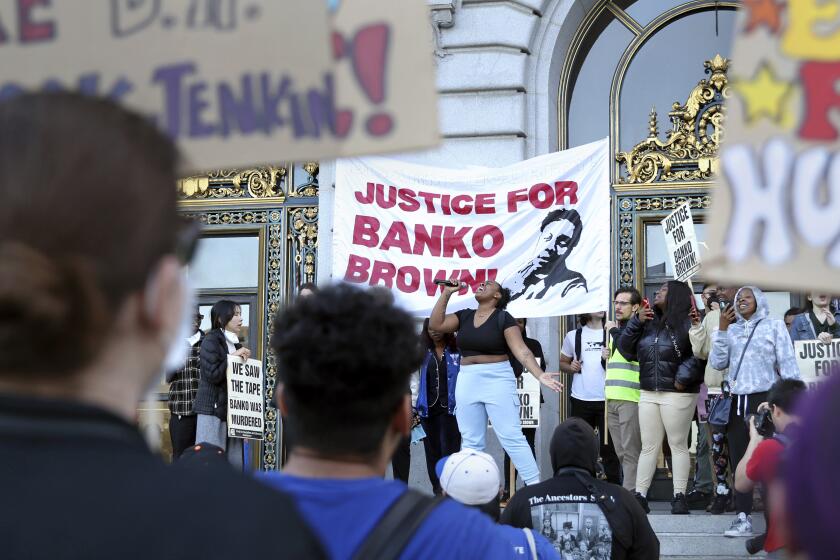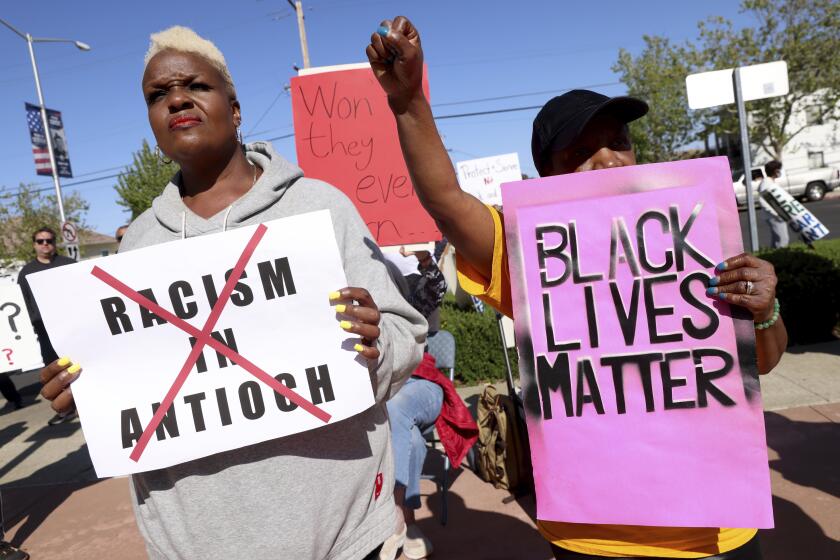Column: Wells Fargo denied well-off borrowers low-interest loans. Is it because they’re Black?

SAN FRANCISCO — Gia Gray seems like a dream client for any bank: a well-off family doctor living in an exclusive Bay Area town, in a 5,000-square-foot mansion with a master bath bigger than my office.
With a credit score topping 800, she expected little drama when she and her husband decided to refinance their Danville home and two other investment properties in 2020 to capture some of the lowest interest rates in recent history — remember when 3% loans were a thing?
But after endless excuses and delays in her applications, “I started feeling Black,” Gray told me. Her bank, Wells Fargo, flat out turned her down on the investment properties, she said, and slow-rolled the application on her residence, coming up with new requirements as the process dragged on.
“At the visceral level, I felt that something was not right,” she said.
Across the country, other borrowers have had similar experiences. Earlier this year, a federal court in Northern California, where Wells Fargo is headquartered, consolidated the claims of Gray and seven other Black plaintiffs into one case that may be certified as a class-action suit in coming months.
The lead attorney in the case, Los Angeles-based Dennis S. Ellis, says up to 750,000 minority customers nationwide — Black, Asian and Latino — could have been affected by what he sees as a pattern of discriminatory lending that left qualified borrowers denied or pushed into higher interest rates and more expensive loans.
It’s a form of modern-day economic redlining, he told me, that if proven true inflicted pain that resonated beyond the borrowers, many of whom lost out on a chance to save hundreds or thousands off their loans each month. It also hurt Black and minority communities as a whole, because it took away an exceptional chance to build generational wealth through affordable homeownership.
“Realizing the American dream of owning your own home is not just about having a safe place to live,” Ellis pointed out. “It’s about securing the future of generations that follow because of the incredible financial stability that homeownership provides.”
Ellis contends that the problem developed in part because Wells Fargo was short-staffed during the pandemic and relied on flawed algorithms and an automated system that may have had discrimination baked into it.
But it wouldn’t be the first time Wells Fargo was found to have discriminated. In 2012, the U.S. Department of Justice won a $175-million settlement against the bank, the second-largest fair-lending settlement in the department’s history, over allegations that Wells Fargo engaged in a pattern or practice of “discrimination against qualified African-American and Hispanic borrowers in its mortgage lending from 2004 through 2009.”
The cities of Oakland and Philadelphia have also sued Wells Fargo for discriminatory lending practices; Philly settled its case for $10 million in 2019.
Wells Fargo has been accused of holding fake job interviews with minority candidates for posts that had already been promised to other applicants, low-balling home appraisals and ignoring issues of discrimination that, as they come to light, may be harming the bank’s bottom line.
A security guard in San Francisco shot Banko Brown, a transgender Black man, exposing how the city’s Black community suffers under the pressures of poverty and racism.
Wells Fargo has denied all of the allegations, including those made in this lawsuit. In a statement, the company said it was confident it was following all required guidelines and that its underwriting practices are consistently applied regardless of a customer’s race or ethnicity.
“These allegations against Wells Fargo stand in stark contrast to the company’s significant and long-term commitment to closing the minority home ownership gap,” the statement read.
It’s not just owning a home, though. It’s owning it on good terms.
Google tells me that a $500,000 30-year loan at 3% interest costs about $900 less a month than a loan at 6% interest — about $324,000 over its lifetime. For the folks who weren’t able to refinance, that’s money lining corporate pockets instead of paying for college or retirement or funding other investments.
The lawsuit alleges that in 2020, “at a time when millions of white Americans were able to take advantage of historically low-interest rates for home loans,” Wells Fargo approved 47% of refinancing applications from Black homeowners, 53% from Hispanic and/or Latino homeowners, and 67% from Asian American applicants. That compares with 71%, 79% and 85%, respectively, for these same groups across all other lenders, according to the lawsuit.
That same year, Wells Fargo approved 71% of residential refinancing applications from white borrowers.
Ouch, Wells Fargo. Those are some dismal numbers.
The lawsuit also alleges that federal data show Wells Fargo was more likely to approve refinancing applications from low-earning white borrowers than high-earning Black borrowers. Analyzing data from 8 million refinancing applications filed in 2020, Ellis and his team found white applicants earning less than $63,000 a year were “more likely to have their refinancing application approved by Wells Fargo than Black refinancing applicants earning between $120,000 and $168,000 a year,” according to the lawsuit.
The insidiousness of financial discrimination lies in how hard it is to prove on an individual basis — and in how hard it is to even believe it’s happening. The loan process can be so remote and impersonal — even more so during the isolation of the pandemic — that Gray and her co-plaintiffs were at first unsure if what they felt was really taking place.
Last week, Gray met two of those other borrowers in person at a news conference in San Francisco. I spoke with the three of them in a coffee shop afterward, but mostly I just listened, because there was a tremendous sense of relief and camaraderie as they shared how similar their experiences had been.
Until the lawsuit, Aaron Braxton, a Los Angeles homeowner, had been left wondering, “Are they doing this to everybody, or are they only doing this to Black folks?” he said.
Braxton was one of the first to file a complaint in 2020. A noted screenwriter, playwright and teacher, Braxton had owned his home in a historically Black neighborhood near USC for about 18 years and owed a fraction of what it was worth when he went to refinance his Wells Fargo mortgage. Like Gray, it was one thing after another, despite never missing a payment and having good credit. By the time Wells Fargo approved his loan, the interest rate had climbed and so had his frustration.
“I told them, ‘I am going to sue you. I don’t know how I’m going to sue you, but I am going to sue you, because I know I am not the only one,’” he said.
Racism within the ranks of law enforcement has long been a contentious issue. But a new California law may force departments to clean house when clear bias is proved.
Gray was scrolling through her phone during the pandemic lockdown and came across a story about Braxton. “It was like a bright bulb,” she recalled, “and I said, ‘Oh, my God, this happened to someone else.’”
Christopher Williams flew in from Georgia, where he owns a home and rental properties. He worked in the financial industry for decades, so when Wells Fargo offered him a loan at 3 points higher than he expected, he asked why. Williams said the bank couldn’t give him clear answers, and he too began to suspect it was about the color of his skin.
Now, Williams said he wonders how many people there are who accepted loans at higher rates or with higher costs without knowing it. “How many of those loans and lines of credit are on the books of Wells Fargo right now?” he asked.
Ellis will be in federal court in San Francisco for the lawsuit on Thursday, the anniversary of the death of George Floyd. He says like the movement Floyd’s death set off to address issues of social justice, he hopes this case can raise awareness of financial injustice and its toll — which he considers the “21st century battleground of civil rights.”
“Just as we’ve cried out against policing practices that kill Black lives, so we denounce Wells Fargo’s racially motivated banking practices that kill Black opportunity,” said civil rights attorney Ben Crump, who is also involved in the case.
Interest rates are not as compelling as the tragedy we witnessed with Floyd, but Crump and Ellis make an important point.
This is a capitalist joint.
Until we all have the same opportunities to create wealth, we’re left with the oppressed and the oppressors, who too often get away with strangling equity under the cover of paperwork and algorithms.
More to Read
Sign up for Essential California
The most important California stories and recommendations in your inbox every morning.
You may occasionally receive promotional content from the Los Angeles Times.













